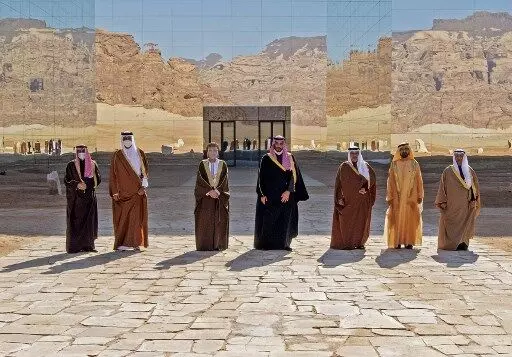
How Gulf Cooperation Council reached the badly needed unity
text_fieldsRiyadh: Detouring all long odds, Arab leaders ended the four-year long blockade giving hope for unity in the region when the Gulf Cooperation Council met in Al-Ula, Saudi Arabia Tuesday.
The Saudi-led alliance imposed the land, sea, and air embargo on Qatar on June 5, 2017 following accusations that Qatar had acted against the interests of the member countries and Arab region on several counts. Subsequently, efforts for reconciliation also did not succeed, as Qatar refused to accept the 13-point demand by the countries.state's proposal which it saw as impinging on its sovereignty and interfering with its internal affairs.
A history of sorts was made a few hours before the Al-Ula summit, as leaders of the six-member GCC chose bonhomie over enmity for the stability of the region that has seen ravages of conflict for long.
In truth, issues that otherwise should have been regional often debouched into international politics as well, chipping away at its influence in the global scene.
The conflict climbed to its peak after Gulf states accused Qatar of supporting terrorist groups.
A trajectory of events preceded the unity these nations achieved yesterday: they include many notables like the hacking of the website of Qatar News Agency on May 24, 2017.
June 5: Saudi, UAE and Bahrain joined hands to blockade Qatar by closing land and air routes.
June 7: Turkey announces it will send troops to Doha to protect Qatar and to import food for Qatar.
June 23: The fourstates put 13 conditions on Qatar to lift the embargo. The conditions included the severing of ties with the Muslim Brotherhood and Hezbollah, and the closure of the Al Jazeera channel.
July 1: Qatar's foreign minister says he rejects conditions as it questions their sovereignty.
July 20: Qatar alleges UAE behind the hack on Qatar news agency.
July 21: Qatar's Emir addresses the nation, declaring that no one will be allowed to question the sovereignty and independence of the country.
July 30: The countries ready for conditional talks with Qatar.
September 19: Qatar's Emir's speech to the UN General Assembly said the blockade against them was unfair and a violation of human rights.
December 5: Qatar's Emir attends GCC meeting in Kuwait while the leaders of the alliance stay away.
January 10, 2018: Qatar files complaint with International Court of Justice, claiming that the blockade is discriminating.
May 30: Qatar's PM attends emergency GCC meeting in Mecca.
November 5: Qatar declares it has survived the blockade. Saudi, UAE, Bahrain Football Federations ready to send teams to Arabian Gulf Cup in Qatar
December 6: Qatar's foreign minister said he was in talks with Saudi to end the dispute.
February 15, 2020: Qatar's foreign minister says mediation talks with other states stalled.
September 10: US Assistant Secretary of State David Schenker says the blockade of Qatar by neighboring countries could end within a week.
November 17: US president Donald Trump's security adviser says the blockade countries will open airspace to Qatar within two months.
December 3: US President Donald Trump's adviser Jared Kushner arrives in Doha and meets with the Emir of Qatar.
December 5: Saudi and Qatar welcome the Statement of the Kuwaiti Foreign Minister that the two sides have reached a compromise.
December 30 - The Saudi King invites the Qatar Emir to attend the GCC Council meeting in Riyadh on January 5. Qatar Emir receives letter directly from GCC Secretary
January 4, 2021: Saudi Arabia ends blockade against Qatar and air and waterways open, Kuwait's foreign minister said. Qatar's emir announces he will attend GCC meeting in Saudi Al-Ula.
January 5, 2021: GCC countries sign the final communique.






















